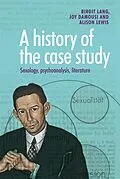This electronic version has been made available under a Creative Commons (BY-NC-ND) open access license. This collection tells the story of the case study genre at a time when it became the genre par excellence for discussing human sexuality across the humanities and life sciences.It is a transcontinental journey from the imperial world of fin-de-siècle Central Europe to the interwar metropolises of Weimar Germany and to the United States of America in the post-war years. Foregrounding the figures of case study pioneers, and highlighting their often radical engagements with the genre, the book scrutinises the case writing practices of Sigmund Freud and his predecessor sexologist Richard von Krafft-Ebing; writers including Leopold von Sacher-Masoch and Alfred Döblin; Weimar intellectuals such as Erich Wulffen and psychoanalyst Viola Bernard. The results are important new insights into the continuing legacy of such writers and into the agency increasingly claimed by the readerships that emerged with the development of modernity.
Autorentext
Birgit Lang is Associate Professor of German at The University of Melbourne Joy Damousi is ARC Kathleen Fitzpatrick Laureate Fellow and Professor of History at The University of Melbourne Alison Lewis is Professor of German at The University of Melbourne
Inhalt
Acknowledgements Introduction Birgit Lang, J oy Damousi and Alison Lewis 1 The shifting case of masochism: Leopold von Sacher-Masoch's V enus im Pelz (1870) Birgit Lang 2 Fin-de-siècle investigations of the 'creative genius' in psychiatry and psychoanalysis Birgit Lang 3 'Writing back': literary satire and Oskar Panizza's Psichopatia criminalis (1898) Birgit Lang 4 Erich Wulffen and the case of the criminal Birgit Lang 5 Alfred Döblin's literary cases about women and crime in Weimar Germany Alison Lewis 6 Viola Bernard and the case study of race in post-war America J oy Damousi Conclusion Birgit Lang, J oy Damousi and Alison Lewis Select bibliography Index
